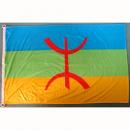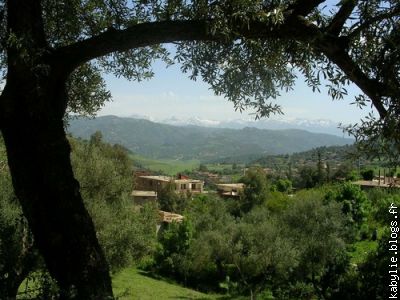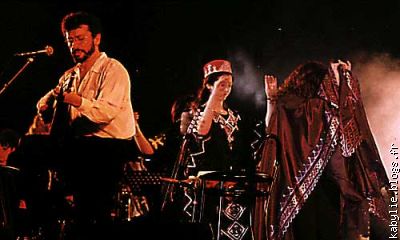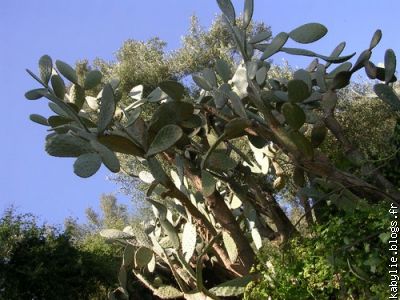Malika Domrane il nome di libertà
Sono denominato la libertà e rifiuto di obbedire. “In una frase, Malika Domrane detto tutti. Era con lo Zenith, a Parigi, sabato il 18 luglio. Il kabyle della Comunità rend omaggio al relativo poet assassinato il 25 giugno in Algeria, Lounès Matoub. Quando Malika evoca oggi ancora la memoria del cantante refrattario, l'emozione la sommerge: “Abbiamo avuti la stessa età, i nostri villaggi siamo vicini.„ Continua il combattimento. Sopportato il 12 marzo 1956 in Tizi-Hibel, ha rifiutato sempre la politica di Arabisation delle autorità algerine. “Malika Domrane„: Cantante exiled in Francia, canta regolarmente nell'omaggio a tutte le vittime algerine. Le relative canzoni, in Berber, sono usate a lui come la lotta e media della comunicazione contro tutto il integrism, ma inoltre che permettono che lui parli dello stato della donna algerina. La personalità forte, Malika Domrane è una delle voci più belle del kabyle di canzone.
luglio 2007 R.Arkam
Le rêve américain
J'ai pris l'avion à l'aéroport de Roissy Charles De Gaulle le 6 avril 2007 en partance pour Montréal, la belle province du Québec.
Dès mon arrivée, je fus bien accueillie et installée au grand hôtel Levesque. En admirant la beauté des paysages , je souhaitais que la neige tomba , quelle ne fût ma surprise quand mon souhait se réalisa !
Un tapis blanc et moelleux comme de la ouate recouvrait la ville de Montréal. Cette vision féerique me fit remonter aux temps heureux et innocents de ma tendre enfance lorsque le Djudjura drapait ses flancs d'un burnous blanc immaculé.ô neige immaculée!
C'est dans une limousine que je fis mon apparition devant le Théâtre Outremont, des flashs crépitaient et m'éblouissaient, voulant sans doute immortaliser ce moment là.
Tendre Mekioussa me maquilla légèrement et me rassura par sa présence malgré le trac qui me tenaillait le ventre. Elle me fît belle pour mon public :miroir, ô mon beau miroir...
La salle fourmillait de monde et quel monde!
On aurait juré que l'élite s'était donnée rendez-vous. Je n'oublie pas la sagesse des trois dames âgées et la douceur de cette foule d'enfants , telle une cerise sur le gâteau.
Je respirais à fond dans les coulisses, et j'entonnais "assaru" . Le public m'acclamait, ovationnant ma présence scénique qui le transportait dans les contrées lointaines de kabylie.
Les chansons sentimentales telles que la bougie et rêves d'adolescence ravivèrent les souvenirs d'un premier amour et d'illusions perdues.
J'enchaînais sur la vieille fille et la femme révoltée accusant un mariage obligé.
Au son d'une complainte , la salle m'écouta dans un silence religieux, certains frémissèrent. Les femmes , une larme au coin de l'oeil, intimèrent ce langage mystérieux qu'elles seules connaissaient le secret!
Sur ma demande, les enfants montèrent sur scène et m'accompagnèrent pour chanter les comptines , dans une expression récréatives.
Comme dans l'ancien temps, autour d'un kanoun, je racontais une histoire transmise par nos grands mères: "Que mon conte soit beau et se déroule comme un fil..."
Alors, je formulais un voeu à l'adresse des parents de ces chérubins, les priant de bien vouloir prolonger la transmission de notre culture. Le message fut passé.
En hommage, j'égrenais la longue liste de ces femmes et de ces hommes qui, avant nous, avaient lutté pour la sauvegarde et la pérennité de l'identité berbère:un devoir de mémoire.
Une chanson entraînante clôt le spectacle dans une ambiance festive.
Montréal a apporté beaucoup de soleil dans ma vie et je suis restée encore sous le charme.
La main du diable
un kabyle en sicile
La Sicile est la plus grande île de la Méditerranée, sa superficie est de 25 709 km2, sa population est estimée à plus de 5 000 000 hab.
Elle est séparée de l'Italie que de 3 km (détroit de Messina). Son chef-lieu est Palermo. Sur l'île il y a deux aéroports internationaux, Falcone e Borsellino à 30 km de Palermo et Fontanarossa à 8 km de Catania. Quant à l'aéroport de Trapani il ne reçoit que des vols nationaux.
Le climat de la Sicile est exceptionnel l'ensoleillement est en moyenne de 2200 h par année. La meilleur période pour séjourner en Sicile est de mai à octobre, les mois les plus chauds sont juillet et août. En hiver et au printemps le sirocco un vent chaud du Sahara souffle parfois sur toute l'île.
le rebelle
Musical Career
Matoub began his singing career under the patronage of the established Kabyle singer Idir. He recorded his first album Ay Izem (The Lion) in 1978; it was a phenomenal success. He went on to record 36 albums, as well as writing songs for other artists. He gave his first major concert in April 1980, at the time of the "Berber Spring" protest movement in Kabylie.
His music mixes oriental Chaabi orchestration with politicized Berber (Tamazight) lyrics and covers a broad variety of topics including: the Berber cause, democracy, freedom, religion, Islamism, love, exile, memory, history, peace and human rights. Unlike the Amazigh poet/musicians who preceded him, Matoub's style was direct and confrontational. Fellow musician Moh Aileche recalls: "He went straight. He criticized a president. He mentioned the president of Algeria right in the beginning of his career. He goes black and white. He was very, very clear in his songs, and he is the only singer – not only Algeria, but in all of North Africa – who criticized the government and criticized clearly. He would never get afraid." [2] Despite being censored from Algerian radio and television Matoub became and remains an extremely popular Kabyle singer.
Political Events
During riots in October 1988 Matoub was shot five times by a policeman and left for dead. He was hospitalised for two years, requiring seventeen operations including the insertion of an artificial sacrum and the contraction of his leg by 5 cm. His 1989 album L'Ironie du sort describes his long convalescence.
During the civil war, which began in 1992, the Islamist Armed Islamic Group (GIA) added his name to a hit list of artists and intellectuals. Matoub remained in Algeria. On 25 September 1994 he was abducted. He was held for two weeks in a GIA mountain stronghold and condemned to death. He was released following a large public demonstration in which his supporters threatened "total war" on the Islamists.
In 1994 he published his autobiography entitled Rebelle (Paris: Stock, 1995).
Prizes
On 6 December 1994 Matoub received Le Prix de la Mémoire (Memorial Prize) from Mrs Danielle Mitterrand, President of La Fondation France Libertés (French Freedom Foundation) in Paris. The prize recognises those who devote their existence to recording and preserving the impact of political events on ordinary lives.
On 22 March 1995 the journalists's organisation S.C.I.J.(Canada) awared him Le Prix de la Liberté d'Expression (Freedom of Expression Prize).
On 19 December 1995 he received Le Prix Tahar Djaout (Tahar Djaout Prize) from La Fondation Nourredine Abba (The Nourredine Abba Foundation) at the UNESCO headquarters in Paris. The prize is named after an Algerian writer who was assassinated by Islamists in 1993.
Assassination and its aftermath
On 25 June 1998 at approximately 12:30pm local time Matoub's car was stopped at a roadblock while he was driving along a mountainous road in eastern Algeria. The car was fired upon by masked gunmen, killing Matoub and wounding his three female passengers. Within hours news of Matoub's murder had spread throughout Kabylie and thousands of angry mourners gathered around the hospital where his body was taken. The crowd shouted "Pouvoir, Assassin" ("Government, Assassins"). A week of violent riots followed his death [3]. Young demonstrators clashed with riot police and attacked government property. On 28 June 1998 tens of thousands people attended his burial in front of his house in his native village. Matoub's family played them a scathing parody of the Algerian National Anthem which came from Matoub's final album Lettre ouverte aux... ("Open letter to..."), released after his death (Gold-Disc). Matoub's assassination occurred a week before a law excluding languages other than Arabic from public life was due to come in to effect. Matoub had been an outspoken critic of this law. On 30 June 1998 the GIA claimed responsibility for the assassination of Lounes Matoub.
On the first anniversary of his death a general strike was observed in Kabyle's capital Tizi-Ouzo and thousands protested on the streets. Protesters broke into the town's court room and tore down its scales of justice. The BBC reported that many Berber activists blamed the government for his death and rejected the claim that Islamists were responsible.
Around 20,000 people marched in Tizi-Ouzo to mark the third anniversary of the assassination.
His family have created a foundation in his name to promote his memory, throw light on the circumstances of his assassination and promote the values he defended. Two streets in France have been named after Matoub, one in Grenoble and one in Lyon.
References
Kabylie A La Memoire De Lounes Matoub In French. Retrieved 24 June 2005.
Blanca Madani (Translator) Lounes Matoub's Memoirs Retrieved 24 June 2005.
Berber Rising! A companion to the 2002 Afropop Worldwide program. Article on Berber music containing musician Moh Alileche's recollections of Lounes Matoub. Retrieved 24 June 2005
Paul A Silverstein (1998) "The Rebel is Dead. Long Live the Martyr!": Kabyle Mobilization and the Assassination of Lounès Matoub Middle East Report Online. Retrieved 25 June 2005.
Peter Snowdon and Hamid Lallami (2-8 July 1998) "The birth of Matoub Lounes" Al-Ahram Weekly Online. Retrieved 25 June 2005.
L'Humanite (3 November 1994) Littérature et Maghreb Article announcing winners of prizes from La Fondation Nourredine Abbas. Retrieved 25 June 2005.
BBC World Service 18:22 GMT (24 June 1999) Algerian police fire on Matoub protesters Retrieved 25 June 2005.
BBC World Service 14:25 GMT (25 June 2001) Berbers mark death of protest singer Retrieved 25 June 2005.
BBC News (12 March 2004 15:30 GMT) Q & A The Berbers Background information on Berber issues.
Copy write by: Rabah Arkam


 Commentaires textes :
Commentaires textes : 









Lire les commentaires textes
DostÄp do Waszej usÅugi jest tak Åatwy, że to imponujÄ ce. DziÄki temu doÅ)wiadczenie jest jeszcze lepsze.
Respekten och vänligheten du visar är exemplarisk. En underbar upplevelse.